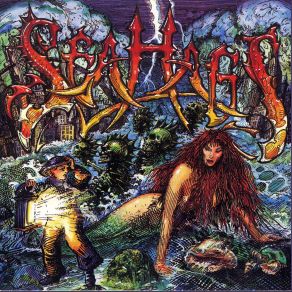Sea Hags
Download links and information about Sea Hags by Sea Hags. This album was released in 1989 and it belongs to Rock, Metal, Pop genres. It contains 11 tracks with total duration of 40:46 minutes.

|
|
|---|---|
| Artist: | Sea Hags |
| Release date: | 1989 |
| Genre: | Rock, Metal, Pop |
| Tracks: | 11 |
| Duration: | 40:46 |
| Buy it NOW at: | |
| Buy on iTunes $8.99 | |
| Buy on Amazon $8.99 | |
Tracks
[Edit]| No. | Title | Length |
|---|---|---|
| 1. | Half the Way Valley | 3:02 |
| 2. | Doghouse | 4:30 |
| 3. | Too Much T-Bone | 3:10 |
| 4. | Someday | 5:10 |
| 5. | Back to the Grind | 4:18 |
| 6. | Bunkbed Creek | 2:31 |
| 7. | In the Mood for Love | 3:08 |
| 8. | Miss Fortune | 4:26 |
| 9. | All the Time | 3:42 |
| 10. | Three's a Charm | 2:42 |
| 11. | Under the Night Stars | 4:07 |
Details
[Edit]Despite the two cities' widely divergent musical cultures, several Seattle-bred musicians (Mötley Crüe's Nikki Sixx, Guns N' Roses bassist Duff McKagan, Faster Pussycat singer Taime Downe, etc.) found fame and fortune after transforming themselves into glamorous, Hollywood hair metal stars; but not the Sea Hags. Maybe their mistake was stopping short while driving down the coast and settling in San Francisco, because the notoriously chemically fueled quartet's only album from 1989, though rapturously received by rock critics, never managed to connect with consumers. In retrospect, and in light of the revealing lessons of grunge a few years later, the more likely explanation is that Sea Hags deeper, darker inclinations (and quite deadlier fuels — i.e. heroin) simply didn't result in the sort of music that the era's party-and-eyeliner-obsessed cock rock masses wanted to hear. Barnstorming opener "Half the Way Valley" is only as lively as its explicit sexual frustration allows (no easy lays for this band, it would seem), and "Doghouse," which arrives hot on its heels with a chugging riff, mid-paced groove, and appropriately whiney vocal delivery, proves even dimmer in outlook and defeatist in story line. With the exception of the subsequent airhead cock rock of "Too Much T-Bone," the aforementioned pairing presages the ensuing material's far more dour and complex preoccupations, including the self-explanatory "Back to the Grind," the memorable start-stop rhythm of "Miss Fortune," the desperate-for-a-fix rush of "All the Time," and the simply fantastic riff of "Under the Night Stars" (too heavy for Hollywood by any measure). All told, they help make this a very unique album for its time and place, and contribute to its having aged surprisingly well, to boot. [The 2007 Rock Candy reissue includes bonus tracks.]